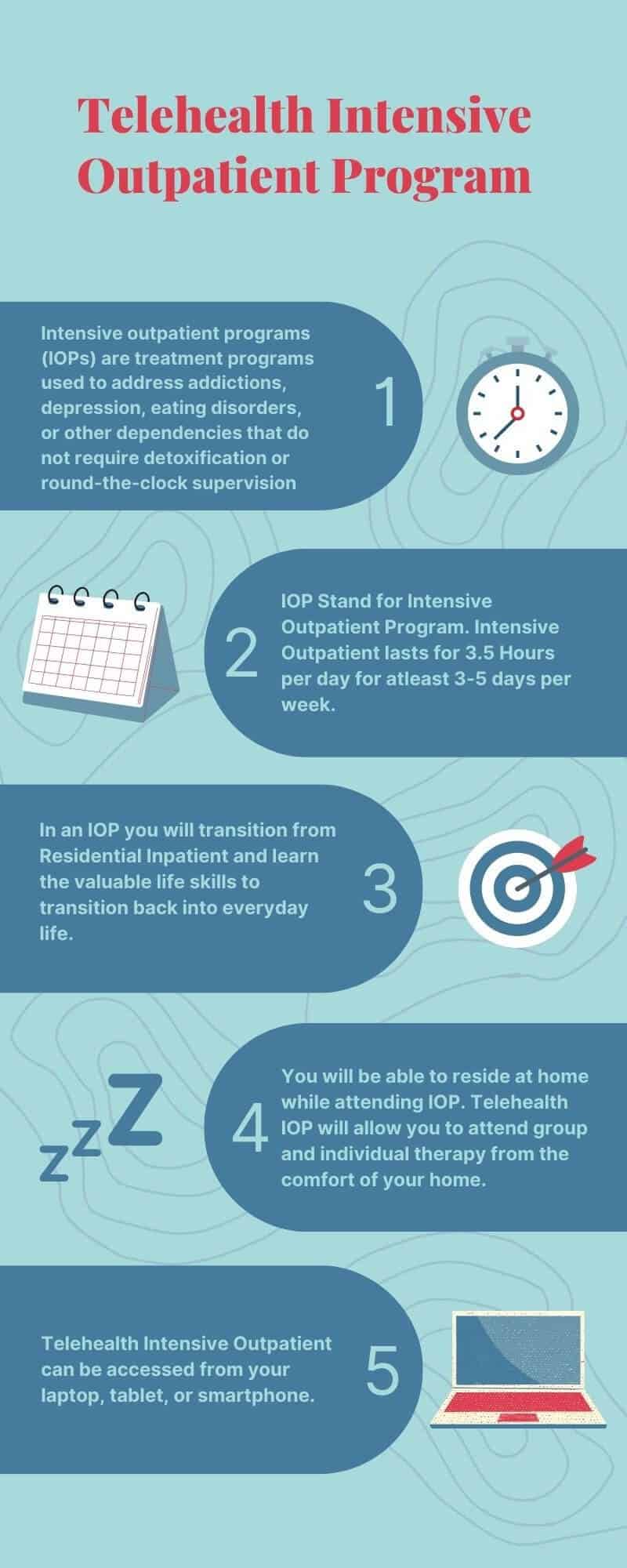The Advantages of Intensive Outpatient Program (IOP) for Long-Term Health.
The Advantages of Intensive Outpatient Program (IOP) for Long-Term Health.
Blog Article
Navigating the Complexities of Twin Diagnosis Therapy Within an Extensive Outpatient Program Setting
In the realm of psychological wellness and addiction treatment, the intersection of dual medical diagnosis provides a nuanced obstacle that requires an extensive and tailored strategy. By discovering the ins and outs of double diagnosis treatment within this extensive outpatient context, a more clear course emerges in the direction of all natural and sustainable recuperation for those grappling with these intertwined obstacles.
Dual Medical Diagnosis Introduction

Comprehending dual medical diagnosis is necessary as it needs a comprehensive and incorporated technique to treatment. By recognizing the interaction between material use and mental health and wellness, healthcare service providers can customize treatments to satisfy the distinct requirements of each individual. This holistic approach not just addresses symptoms yet additionally targets hidden factors that add to the double diagnosis.
Furthermore, neglected twin diagnosis can cause a cycle of relapse and aggravating psychological wellness signs and symptoms. By identifying the intricacy of twin medical diagnosis and supplying specific care, healthcare specialists can sustain people in accomplishing long-term healing and improved mental wellness.
Tailored Treatment Plans
Identifying the intricate interplay in between material use conditions and psychological health conditions, the development of customized treatment plans is vital in addressing the complexities of twin diagnosis in psychological wellness therapy. Tailored treatment strategies are personalized methods that think about the distinct demands, challenges, and objectives of individuals facing twin diagnosis. These strategies are developed collaboratively by a multidisciplinary group of specialists, including psychoanalysts, psychologists, social employees, and dependency specialists, to make certain thorough and integrated care.
Tailored treatment plans typically entail a combination of treatments, drugs, and behavioral interventions that target both the compound usage problem and the psychological health condition simultaneously. These plans might include cognitive-behavioral treatment, dialectical behavior modification, medication-assisted treatment, individual counseling, group treatment, and family therapy, among various other evidence-based interventions. By personalizing therapy strategies to individual conditions, tailored strategies can address the origin creates of dual medical diagnosis, promote lasting recovery, and enhance total lifestyle for individuals fighting with co-occurring conditions.
Integrated Treatment Technique
An integrated treatment technique in twin diagnosis therapy incorporates clinical, emotional, and social treatments to attend to the complex needs of people with co-occurring compound use disorders and psychological wellness problems. This technique acknowledges that dealing with one element of a double medical diagnosis without attending to the other can cause inefficient results. By incorporating medical interventions such as medicine management for mental health conditions with mental therapies like cognitive-behavioral therapy for substance use problems, individuals obtain extensive care that targets all elements of their double medical diagnosis.
Moreover, the social element of incorporated care involves resolving ecological factors that may contribute to the development or perpetuation of material use and psychological health and wellness issues. This can consist of family dynamics, real estate instability, or absence of social assistance. By including social interventions like household therapy, vocational assistance, and community resources, the therapy ends up being a lot more holistic and tailored to the individual's specific requirements. On the whole, an integrated care strategy in double medical diagnosis Click Here therapy within an extensive outpatient program setting intends to give detailed, effective, and customized treatment to people dealing with co-occurring disorders.
Challenges in IOP Establishing
In the context of double diagnosis treatment within an intensive outpatient program, browsing the complexities of co-occurring material use conditions and mental wellness conditions provides considerable challenges. Among the key hurdles in the that site IOP setup is the control of care between mental health and wellness specialists and chemical abuse professionals to make sure a detailed treatment strategy. This calls for efficient interaction, partnership, and a deep understanding of exactly how these conditions engage and affect each other.

Furthermore, dealing with stigma and resistance to treatment within the click here for more IOP setting can impede progression. Some people might be reluctant to reveal their twin medical diagnosis or might feel embarrassed, hindering their involvement in the therapeutic process. Conquering these barriers demands an encouraging and non-judgmental environment that promotes count on and openness.

Collaborative Specialist Initiatives
Effective twin medical diagnosis treatment in an intensive outpatient program demands seamless cooperation among psychological health and wellness professionals and compound misuse specialists to make sure a thorough and integrated approach to care. By working with each other, these professionals can develop customized treatment plans that provide to the unique demands of each client, taking into consideration both their mental wellness and compound misuse challenges.
Collaborative efforts additionally extend to regular communication and details sharing among group participants to make sure a cohesive therapy approach. Ultimately, a joined front of experts functioning together improves the effectiveness of twin diagnosis therapy within an extensive outpatient program.
Conclusion
In final thought, effective double diagnosis therapy within an intensive outpatient program setting calls for customized treatment plans and an incorporated treatment technique. Difficulties may develop in this setup, however collective initiatives amongst specialists can aid browse these intricacies. By addressing the distinct requirements of people with co-occurring mental wellness and substance make use of disorders, IOP programs can provide detailed and alternative like support recuperation and total wellness.
Report this page